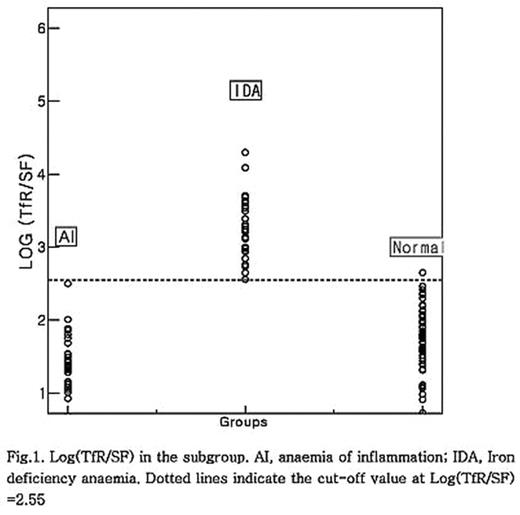Abstract
The incidence of iron deficiency anaemia in 6∼24 month old infants due to increase in iron demand for growth spurt is reported ranged 10 to 40%. However this age group has a common acute illness such as urinary tract infection, pneumonia, and other viral infections. The aim of this study is to evaluate that iron parameter and acute phase reactant are useful parameters in differentiating anaemia by infection from anemia by iron deficiency and the mixed anaemia of these. Among 6–24 months of the infants who visited Gyeongsang Univeristy Hospital for 7 years from 2000 to 2006, 131 infants were enrolled. Hemoglobin(Hb), serum ferritin(SF), serum transferrin receptor(STfR), C reactive protein(CRP), interleukin-6(IL-6), prohepcidine were checked. The subgroup of anaemia of inflammation(AI) was defined as Hb <11 g/dL and SF >50 μg/L, the subgroup of iron deficiency anaemia(IDA) as Hb <11 g/dL and SF <12 μg/L and the normal group as Hb ≥11 and SF ≥12 μg/L. The mean STfR in the subgroup of AI, IDA and normal was 3.89(±2.64), 10.6(±4.95) and 3.96(±1.24), respectively. The mean STfR/Log SF of subgroup was 1.87(±1.55), 36.11(±71.5), 2.31(±0.97), respectively. The mean Log(STfR/SF) was statistically significant between 3 subgroup. All IDA group had Log(STfR/SF) >2.55 whereas in all subjects classified as AI it was <2.55, thus clearly separating two. The mean IL-6 of AI was significantly higher than IDA subgroup and the mean prohepcidine of AI was significantly lower than the normal group. Calculating Log(STfR/SF) is a useful criteria in classification of the iron status. Prohepcine has nothing to do with AI. Iron signal predominant over inflammatory signal in AI.
The Mean(±SD) of STfR, STfR/LogSF, Log (TfR/SF), CRP, IL-6 and Prohepcidine in Subgroups.
| . | AI . | IDA . | Normal . |
|---|---|---|---|
| Same letters mean that are not significantly different (P <0.05) AI, anaemia of inflammation; IDA, iron deficiency anaemia | |||
| Subgroup(%) | 33(25) | 29(22) | 69(53) |
| Hg(g/dL) | <11 | <11 | ≥11 |
| SF(μg/L) | >50 | <12 | ≥12 |
| STfR mean(±SD) | 3.89(2.64)a | 10.6(4.95) b | 3.96(1.24) a |
| STfR/LogSF mean (±SD) | 1.87(1.55) a | 36.11(71.5) b | 2.31(0.97) a |
| Log (TfR/SF) mean(±SD) | 1.30(0.56) a | 3.29(0.43) b | 1.76(0.43) c |
| CRP mean(±SD) | 28(39.2) a | 7.6(9.6) b | 17(28.0) a |
| IL-6 mean(±SD) | 6.1(10.5) a | 2.0(6.3) b | 4.78(11.3) c |
| Prohepcidine mean(±SD) | 204(70.5) a | 234(144) a | 301(120.6) b |
| . | AI . | IDA . | Normal . |
|---|---|---|---|
| Same letters mean that are not significantly different (P <0.05) AI, anaemia of inflammation; IDA, iron deficiency anaemia | |||
| Subgroup(%) | 33(25) | 29(22) | 69(53) |
| Hg(g/dL) | <11 | <11 | ≥11 |
| SF(μg/L) | >50 | <12 | ≥12 |
| STfR mean(±SD) | 3.89(2.64)a | 10.6(4.95) b | 3.96(1.24) a |
| STfR/LogSF mean (±SD) | 1.87(1.55) a | 36.11(71.5) b | 2.31(0.97) a |
| Log (TfR/SF) mean(±SD) | 1.30(0.56) a | 3.29(0.43) b | 1.76(0.43) c |
| CRP mean(±SD) | 28(39.2) a | 7.6(9.6) b | 17(28.0) a |
| IL-6 mean(±SD) | 6.1(10.5) a | 2.0(6.3) b | 4.78(11.3) c |
| Prohepcidine mean(±SD) | 204(70.5) a | 234(144) a | 301(120.6) b |
Log(TfR/SF) in the subgroup. AI, anaemia of inflammation; IDA, Iron deficiency anaemia. Dotted lines indicate the cut-off value at Log(TfR/SF)=2.55
Log(TfR/SF) in the subgroup. AI, anaemia of inflammation; IDA, Iron deficiency anaemia. Dotted lines indicate the cut-off value at Log(TfR/SF)=2.55
Author notes
Disclosure: No relevant conflicts of interest to declare


This feature is available to Subscribers Only
Sign In or Create an Account Close Modal